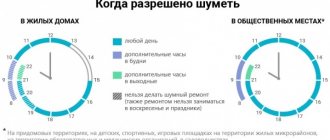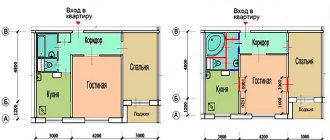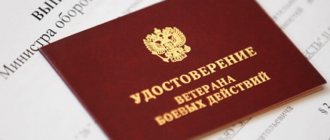Federal Law 52 - the law on silence and noise in the new edition
Any citizen of our country, according to the law, has the right to complete rest. Therefore, the silent mode must be observed by everyone without exception. A person who makes noise at night will be punished under federal law under Section 52. It states when being noisy is considered a misdemeanor.
Noise is a global problem for every citizen. The fact is that a person is almost constantly in a noise zone: in a store, . However, everyone wants to relax after a hard day of work or school.
Thus, noise is a disturbance of silence, the sources of which can be the following factors:
- high-pitched conversations or scandals between apartment residents;
- loud music;
- crying of children (in particular infants);
- dog's bark;
- loud operation of household appliances (for example, a washing machine);
- noise emanating from the movement of cars;
- unloading and loading operations.
- repairs from neighbors;
In order to observe the law of silence in a residential building, residents must comply with the rules of residence, as well as know and live on the basis of the law “On Silence”. For example, there are types of noise that ordinary citizens cannot influence.
These are emergency work, investigative actions and the like. The latest edition of Federal Law No. 52 “On the sanitary and epidemiological welfare of the population,” published on November 28, 2020, includes 60 articles.
Based on the legislation of the Russian Federation, it is prohibited to open any companies (cafes, buffets, hookah bars) in an apartment building. However, situations are becoming more frequent when the law on maintaining silence is violated. In such cases, the heads and managers of these institutions undertake to immediately take measures to isolate sound in the room.
As for repairs, they should be carried out in a residential building exclusively during the day.
The fact is that families with children who need healthy and sound sleep can live in one of the apartments. No less important
Federal law on silence in 2020: new law on weekends and night time – Legal expert
Conflicts between neighbors in most cases arise due to the fact that someone exceeds the permissible noise level, and thereby interferes with the rest of other people. The rules of conduct for residents of apartment buildings and punishment for violating them are regulated by the law on silence in 2019-2020.
Federal Law on maintaining silence in an apartment building in 2019-2020: official text
For the first time, State Duma deputies were faced with the need to adopt Federal Law 52 in 1999. The new bill has determined the time when it is forbidden to make noise in apartments. The official text was changed several times, establishing new periods of silence.
Today, the law requires residents of apartment buildings to reduce the volume level in their premises to 30 dB between 21:00 and 8:00 on weekdays. Silence on weekends and holidays should be ensured from 22.00 to 10.00. Parliamentarians made an exception for New Year's Eve, when noise is officially allowed.
Certain rules have been established for carrying out repair work. According to the law on silence, residents of apartment buildings are obliged to ensure a low level of noise, regardless of the reasons for which it is produced. Otherwise, other residents have the right to complain about violators, and they will have to pay fines for disturbing the silence.
To avoid misunderstandings with neighbors, we suggest downloading the text of the law on silence from the following link. It contains complete information in the latest version of the bill.
The law on silence in Moscow and the Moscow region - time of silence and responsibility for its violation, noisy work
Sound sleep is the basis of human health. Living in apartment buildings can reduce the quality of your vacation. Not every neighbor is ready to respect the personal time of others. To avoid such situations, the legislator provided for the Law on Silence, which was duplicated by many regions. Let’s take a closer look at how to deal with trespassers.
Legal basis of the silence law
The permissible level of noise and vibration in residential premises is regulated by sanitary and epidemiological standards and GOSTs. They are based on studies that have shown the harmful effects of increased noise levels on the human body.
Moscow legislators adopted Law 42, which is colloquially called the Law on Silence in Moscow. They establish the following standards:
- a period of time during the day when noise cannot be made (quiet hour);
- a period during which you can do repairs and listen to music loudly;
- a list of sounds that cannot be made at night (singing, moving furniture, etc.);
- exceptions.
Silence law in 2020
The law of silence in Moscow defines a list of sounds that are considered noisy and prohibited at the time established by regulations:
- music from recreation organizations located near residential premises;
- rearrangement of furniture, loading work;
- scandals and quarrels;
- dog barking;
- carrying out repairs and redevelopment;
- music and TV shows played with poor sound levels.
An additional advantage of the new law is the establishment of an hour of silence from 13.00 to 15.00. This period is designated for children's daytime sleep.
How much noise can you make on weekdays and weekends?
The law separates the ability to make noise on weekdays, weekends and holidays. The period of free time from restrictions is established by Moscow legislation. You can rearrange, play with the dog and drill the walls on weekdays at certain times:
- from 09.00 to 13.00;
- from 15.00 to 19.00.
Exceeding the established noise level on holidays is possible in the following cases:
- on Saturday;
- when carrying out repair work related to the safety of residents;
- prevention and elimination of natural disasters;
- when holding events by religious organizations.
In other cases, it is illegal to exceed the noise level on weekends.
The law on silence in the Moscow region provides for a longer period of time for carrying out noisy work. It amounts to:
- from 09.00 to 13.00;
- 00 to 21.00 (on weekdays);
- 00 to 22.00 (on weekends).
One can note the diametrical approach of legislators in Moscow and the Moscow region to ensuring silence in residential buildings. In addition, weekends are not grounds for suspending repairs.
When can you renovate your apartment?
To avoid disturbing the peace and quiet of citizens, the law establishes a period for carrying out repair work. The issue of silence is problematic for Moscow residents. Since 2002, there have been repeated attempts to regulate it in various regulations. The first law on silence in Moscow did not regulate the issue of repair work, which, given the volume of construction in the city, was initially a mistake.
After several unsuccessful options, changes were made to the new silence law:
- night time is the period from 23.00 to 07.00;
- the list of works that are classified as noisy has been added;
- there is a ban on redevelopment and noisy renovations on holidays and Sundays;
- the period for noisy activities is from 09.00 to 19.00;
- from 13.00 to 15.00 there is an hour of silence;
The exception is new buildings. Repairs can be carried out in them at any time, within 1.5 years from the date of delivery of the house.
Acceptable noise level
Due to the fact that the concept of “loud sound” is figurative, the legislator has provided for a more specific expression of noise. The unit of sound measurement is the decibel.
The official text of the document provides for the following norms:
- during the day – from 40 to 55 dB;
- during the night – from 30 to 45 dB.
To understand the noise level at a household level, compare it with a car alarm. Its level is 80 dB.
Responsibility for violating public order
Each person, existing in a social society, is obliged in his behavior to take into account the interests of the people around him. Society has established rules of behavior, mutual respect and responsibility for breaking order.
Someone wants to sleep after a hard day at home, someone wants to get home by bus in complete peace and quiet. He has the right to this, and his right is guaranteed by regulations.
Violating public order in the country is not only an administrative offense, but also a criminal offense. The material in this article will tell you what awaits troublemakers and hooligans, and what rules apply in a safe society. Public order is the rules of behavior of citizens in society, established by legislative acts, generally accepted moral norms, traditions and customs.
Anything that is out of the ordinary may be considered a public nuisance. For example, you can’t walk naked down the street, you can’t make loud noise, you can’t go to the toilet in the wrong places, etc.
Such actions in society can be represented by two types:
- Legal is behavior that is prescribed by law as unacceptable. As a rule, such violations seriously threaten public safety, the life and health of people, and their property.
- Non-legal - these are norms that have developed in society, but are not enshrined in law. As a rule, in this case, attackers can only face reprimand from others.
Illegal actions may include pushing people on public transport, not wanting to give up a seat on a bus, or using obscene language in crowded places.
The current legislation contains about a hundred violations of public order.
Violation of public order at night article
This initiative was taken by the Legislative Assembly of the Jewish Autonomous Region.
The project proposes to supplement the Code of Administrative Offenses with the article “Violating the peace and quiet of citizens at night.” Under this article, an ordinary person who gives his neighbors a restless night will have to pay a fine of one thousand to two thousand rubles. If the organization broke the silence, the fine will be much higher.
A legal entity will pay from 30 to 50 thousand rubles. For example, a fine may be issued to a restaurant that produces excessively loud music. WATCH THE VIDEO ON THE TOPIC: Until what time can you make noise in an apartment Violation of peace and quiet Recently, cases of citizens filing complaints about violation of peace and quiet at night have become more frequent.
According to Art. The use of televisions, radios, tape recorders, other sound-reproducing devices, as well as sound amplification devices, including those installed on vehicles, retail facilities, facilities in which household services are provided, catering services, market services, resulting in a violation of the peace and quiet of citizens at night time at protected facilities in St. Petersburg entails a warning or the imposition of an administrative fine on citizens in the amount of five hundred to four thousand rubles; for officials - from five thousand to ten thousand rubles; for legal entities - from twenty-five thousand to fifty thousand rubles. Screaming, whistling, knocking, moving furniture, singing, playing musical instruments and other actions that entail a violation of the peace and quiet of citizens at night at protected objects in St. Petersburg, entail a warning or the imposition of an administrative fine on citizens in the amount of five hundred to four thousand rubles; for officials - from five thousand to ten thousand rubles; for legal entities - from twenty-five thousand to fifty thousand rubles.
Legal regional document
The document officially establishing how much noise can be allowed in the Leningrad region is the regional law “On Administrative Offenses” dated July 2, 2003 No. 47-oz. Additions were made to it on December 29, 2018. Therefore, from January 1, 2020, the document has been in use in a new edition, but the changes did not directly affect Article 2.6 “Violation of the peace and quiet of citizens” (the edition is still in force in 2017).
National standards for noise levels are set out in SanPiN 2.1.2.2645-10. Compliance with these sanitary rules is obligated by Article 23 of Law No. 52-FZ of March 30, 1999 “On the sanitary and epidemiological welfare of the population.”
According to federal regulations, nighttime noise prohibitions are:
- between 23:00 and 7:00 the next day.
Depending on the specifics, each region has the right to adjust the night silence regime for itself, but only in the direction of tightening.
Violation of public order at night article
About 80% of the population experiences discomfort from noise. In Russian cities, in places of increased acoustic pollution, on average, more than 60% of the population of these cities live.
In Russia as a whole, in different regions, up to 80% of the population is affected by this type of pollution, which greatly affects the life expectancy of citizens.
The legislation almost completely lacks significant administrative liability for any harmful noise impacts in public or residential buildings, as well as adjacent areas at night, and liability for violation in most cases is resolved through regional legislation. In most regions of the country, laws of direct action have appeared that limit the noise impact on the health of citizens, which disrupts their silence and rest, especially citizens staying in homes, hospitals, sanatoriums and rest homes.
The Constitution provides that the exercise of human freedoms must not violate the freedoms of others.
Federal Law No. 52 “On Sanitary and Epidemiological Welfare”, as well as various sanitary rules, hygienic standards and technical regulations requirements contain norms that determine permanent sources of noise exposure, including during the daytime - most often, such an unfavorable situation arises due to short-term noise impacts (car horns, turning on car radios, etc.)
d.). According to the Russian Housing Code, the owner of the premises is obliged to keep it in proper condition, while not allowing it to be neglected.
The Rules for the Use of Premises and Maintenance of the House, in force until 2005, approved by Ministerial Resolution No. 415 of September 25, obligated employers “to not allow actions that create increased noise or vibration that violate the living conditions of citizens in other residential premises. The use of televisions, tape recorders and loud-speaking devices may be permitted provided that audibility is reduced to an extent that does not disturb the peace of the residents of the house.
Violation of public order at night by the Code of Administrative Offenses of the Russian Federation
Every person after a hard day wants to relax in peace and quiet.
We recommend reading: Emergency physician consultant functions
Also, silence after 23:00 is necessary if there are small children in the house who sleep according to a schedule, or elderly people who are used to going to bed early.
Residents of the house must comply with the rules, otherwise they face a hefty fine. It is a mistake to believe that if neighbors complain about excessive noise, it means that they are harmful and scandalous.
The fact is that doctors believe that at 150 dB a person can lose their hearing. That is why there are noise limits that cannot be exceeded.
Otherwise, the violator may be subject to administrative liability. Avoiding conflict is not difficult, just follow the rules and not make noise at night. How to deal with noise after 23:00: noise limits, exceeding which impairs hearing Some people purchase a special device that determines the noise level in decibels.
For those who do not have such a mechanism, here are some examples:
- heavy music above 120 dB is dangerous for hearing;
- Also, the noise of the machines should not exceed 85 dB, otherwise problems will arise.
- Children's screaming above 75 dB threatens hearing impairment;
- Conversation above 50 dB also negatively affects hearing;
- airplane turbine noise exceeding 120 dB has a negative impact on hearing;
- leaf noise exceeding 40 dB is harmful to hearing;
During the day, all these norms can be exceeded, since there will be no fine for this.
The only thing is that you will significantly worsen your hearing. As for night time, there should be no loud sounds after 23:00.
Quiet Laws Excessive noise at night is a public nuisance. In accordance with the law of the Russian Federation, a fine is established for this violation. Info In these cases, the motive is to satisfy the individualistic need for self-affirmation by belittling and ignoring the merits of other people.
5. The theory of administrative law classifies the sign of public danger as a mandatory feature that characterizes an offense (for the sign of public danger, see the commentary to Article 2.1)
Law On Noise in Apartments 2020
According to the law, catering establishments (cafes, restaurants, karaoke bars, etc.) cannot be opened in residential buildings. But in practice, it happens when the law is not fully observed. At the same time, the owners of such establishments are obliged to take measures to soundproof the premises. Even beauty salons located in apartment buildings can cause considerable trouble for neighbors without soundproofing. For example, the constant operation of a hair dryer and other noisy appliances.
We recommend reading: Calculation and Payment of Maternity Benefits in 2020
Noise is one of the most pressing problems for metropolitan residents. Noise surrounds people everywhere: in transport, at work, in a shopping center. Every person comes home and wants to relax, gain strength in peace and quiet. Why can someone violate this right? Noise is a disturbance of silence caused by various factors, for example:
Administrative fine for violating silence and noise at night
» Every resident of Russia has the right to a well-deserved rest after a hard day and guaranteed silence at night.
Violation of this right is not permitted due to strict control by Russian legislation. However, not everyone still knows what fines are provided for violating silence and how to bring the offender to justice. The legislation of the Russian Federation provides for certain rules regarding maintaining silence at night and some during the day.
At certain hours, established by regulations of state and regional authorities, loud noise is not allowed both during construction work and in the house or in the area nearby (for example, when a car alarm is running for a long time). At night, any strong noise implies an encroachment on the peace of a citizen, but during the day it is much more difficult to get rid of it, since usually noise during daylight hours falls within the definition of acceptable, in accordance with Federal Law No. 52 of 1999 on March 30. This law regulates the permitted level of noise at night and during the day.
Although it is recommended to negotiate with people disturbing the peace in a peaceful manner, every citizen has every right to contact the police to bring the troublemakers to administrative responsibility.
Existing ways to resolve the situation without the intervention of law enforcement agencies:
- conversation with people disturbing the peace (for example, quite often noisy neighbors do not suspect that they can be clearly heard in the evening, so a simple conversation and explanation of the situation can be most effective);
- treatment with someone authorized to keep order in your home.
If none of the above methods help, you need to call the police or go to court if other methods of resolving the conflict situation cannot be used. We recommend the article: . The time period during which the peace of residents must not be disturbed varies
Law on disturbing the peace and quiet of citizens at night 2020
» » » Every citizen has the right to ensure peace and quiet from his neighbors or neighboring businesses.
True, it is quite difficult to achieve this right on the part of the injured parties, but with their active position, correct application of the rules of law and sequence of actions, it is quite possible to achieve the desired effect. For the correct sequence of actions, victims need to know their basic rights and what legal acts should be used for protection.
Dear readers!
Our articles talk about typical ways to resolve legal issues, but each case is unique.
If you want to find out how to solve your specific problem, please contact the online consultant form on the right.
It's fast and free! Or call us at: +7 (499) 703-47-59 Moscow, Moscow region St. Petersburg, Leningrad region Federal number (free call for all regions of Russia)! Here it is necessary to discuss the problems of the emergence of administrative liability for violation of peace and quiet by citizens.
In accordance with sanitary and epidemiological standards, each person can tolerate constant noise of up to 55 dB during the daytime and 40 at night without harm to health.
However, the standards set restrictions only in relation to physiological requirements; they say nothing about living comfort conditions. However, these standards require constant increase in large cities due to the increase in noise levels in them. For example, noise during road works is estimated to be up to 100 dB, the sound of a running motorcycle - up to 90 dB, busy traffic of cars on the streets - up to 80 dB, the sound of car horns - up to 120 dB.
The need for residents to comply with sanitary standards in apartments is regulated by Rospotrebnadzor (the right is regulated in the Code of Administrative Offenses of the Russian Federation).
Violation of Public Order at Night Code of the Russian Federation
- Legislation of the Russian Federation
- home
- By virtue of Part 1 of Art. 1. 1 of the Code of Administrative Offenses of the Russian Federation, legislation on administrative offenses consists of this Code and the laws of the constituent entities of the Russian Federation on administrative offenses adopted in accordance with it.
Thus, the rules of law containing a ban on committing actions that disturb the peace of citizens at night, as well as the rules of responsibility for such actions, are adopted by the authorities of your region. “Law on silence” - what kind of law is it?There is no federal “silence law.” Moreover, there is no law with this name.
Silence laws are regional laws that contain legal norms prohibiting disturbing the peace and quiet of citizens at night under threat of punishment - a warning or a fine. Each region of Russia has its own rules on prohibiting making noise at night. The procedure for bringing to justice for disturbing the peace of citizens at night is regulated by the norms of the Code of Administrative Offenses of the Russian Federation. However, as stated above, the ban itself, as well as the rules on liability, must be adopted by regional authorities, which determine what is “night time”, what is the scope of liability (amount of fine), which objects fall under the protection of the law.
On the Internet you can easily find regional laws providing for liability for disturbing the peace of citizens at night in your region. What is "night time"? Each region defines its own night time. For example, according to the Moscow law “On maintaining the peace of citizens and silence in the city.”
Moscow" No. 42 dated July 12, 2012 , night time - the period of time from 23:00 to 7:00.
In accordance with Part 1 of Art. 10.1 Law
Silence law from January 1, 2020
Restless behavior of a child cannot be considered a rarity, but even it is a direct violation of the law if a restless child constantly throws tantrums or starts running around the rooms in search of his favorite toy, doing this not only during the day, but also at night.
- From 1 to 2 pm – “quiet hour” on all days of the week;
- From 10 pm to 7 am – noise is prohibited on weekdays;
- From 10 pm to 9 am – noise is prohibited on holidays and weekends;
- From 7 am to 8 pm – repair work can be carried out on weekdays;
- From 9 am to 8 pm - you can do repairs on weekends and holidays.
Violation of public order at night by the Code of Administrative Offenses of the Russian Federation
Every person after a hard day wants to relax in peace and quiet.
Also, silence after 23:00 is necessary if there are small children in the house who sleep according to a schedule, or elderly people who are used to going to bed early. Residents of the house must comply with the rules, otherwise they face a hefty fine. It is a mistake to believe that if neighbors complain about excessive noise, it means that they are harmful and scandalous.
The fact is that doctors believe that at 150 dB a person can lose their hearing.
That is why there are noise limits that cannot be exceeded. Otherwise, the violator may be subject to administrative liability. For those who do not have such a mechanism, here are some examples:
- Conversation above 50 dB also negatively affects hearing;
- airplane turbine noise exceeding 120 dB has a negative impact on hearing;
- leaf noise exceeding 40 dB is harmful to hearing;
- heavy music above 120 dB is dangerous for hearing;
- Also, the noise of the machines should not exceed 85 dB, otherwise problems will arise.
- Children's screaming above 75 dB threatens hearing impairment;
During the day, all these norms can be exceeded, since there will be no fine for this.
Avoiding conflict is not difficult, just follow the rules and not make noise at night. How to deal with noise after 23:00: noise limits, exceeding which impairs hearing Some people purchase a special device that determines the noise level in decibels.
The only thing is that you will significantly worsen your hearing. As for night time, there should be no loud sounds after 23:00. Quiet Laws Excessive noise at night is a public nuisance. In accordance with the law of the Russian Federation, a fine is established for this violation. Info In these cases, the motive is to satisfy the individualistic need for self-affirmation by belittling and ignoring the merits of other people.
5. The theory of administrative law classifies the sign of public danger as a mandatory feature that characterizes an offense (for the sign of public danger, see the commentary to Article 2.1)
Violation of public order at night article
» Contents Every citizen of Russia has the right to rest after a working day, which should not be disturbed, including by shouting or sounds from repairs.
To this end, the law provides for certain standards regarding the observance of peace at night and during certain hours of the morning, evening and daytime. The violator will face an administrative fine for violating the silence at night.
However, this penalty differs in each region. There is no all-Russian federal law “on silence” yet. This area is regulated by Federal Law of March 30, 1999 No. 52-FZ
“On the sanitary and epidemiological well-being of the population”
.
The mentioned law states that residential premises must be operated in accordance with sanitary standards, which include the permissible sound level (clause 3, article 23). The standards themselves are prescribed in SN2.2.4/2.1.8.562-96, where the tables show the levels of permissible noise in various rooms.
Maximum sound levels that can enter residential areas.
Category of premises Time of day Noise level Living rooms of apartments, houses, dormitories From 7 to 23 o'clock - daytime 40 dBa (decibel A) From 23 to o'clock - night time 30 dBa (decibel A) Sanitary standards dictate not only nighttime, but also daytime noise level. But you need to realize that if during the daytime some noise can be ignored, then at night it can result in a call to the police and a fine.
Noise is measured with a special device, a sound level meter. A detailed gradation of sound levels can be seen in the table.
So that the average person can understand what 30-40 decibels from sanitary standards can be compared with, here is a list of sounds:
- repair work - 140 decibels.
- washing machine operation – from 50 to 70 decibels;
- noise from a vacuum cleaner - 80 decibels;
- normal conversation - from 45 to 60 decibels;
- baby crying – 80 decibels;
Obviously, you should not operate household appliances, do laundry, talk loudly, or carry out repair work at night. There are also noise limits during the day and at night.
Law on silence 2020 in St. Petersburg
The Federal Law on Silence - “On the Sanitary and Epidemiological Welfare of the Population” dated March 30, 1999 No. 52-FZ (as amended on April 18, 2020) established that night time is the period from 23.00 and ends at 7.00. It also stipulates noise level limits that must not be violated during the day and night hours. For example, at night it is prohibited to make noise no louder than 30 decibels, and from 7.00 to 23.00 - up to 40 decibels.
When is it illegal to make noise in an apartment building in St. Petersburg? The law on silence in St. Petersburg says that citizens should behave as quietly and calmly as possible from 22.00 to 8.00. Let's look at the consequences of violating this rule. So, according to Art. 8 of the Law of St. Petersburg No. 273-70:
Read more about the administrative fine for violating silence at night
Show Menu
- LeasingWhat the law says Every citizen of Russia has the right to rest after a working day, which should not be disturbed, including by shouting or sounds from repairs. For this, the law provides for certain standards regarding the observance of rest at night and at certain hours of the morning, evening and daytime .The violator will face an administrative fine for violating the silence at night.
However, this fine is different in each region. Is there a federal law on silence? There is no all-Russian federal law “on silence” yet. This area is regulated by the Federal Law of March 30, 1999 No. 52-FZ “On sanitary and epidemiological welfare - Cash
- No guarantors
- Without certificates
- home
- Loans
- No guarantors
- Without certificates
- Cash
- LeasingWhat the law says Every citizen of Russia has the right to rest after a working day, which should not be disturbed, including by shouting or sounds from repairs. For this, the law provides for certain standards regarding the observance of rest at night and at certain hours of the morning, evening and daytime .The violator will face an administrative fine for violating the silence at night.
However, this fine is different in each region. Is there a federal law on silence? There is no all-Russian federal law “on silence” yet. This area is regulated by the Federal Law of March 30, 1999 No. 52-FZ “On sanitary and epidemiological welfare
- Deposits
- Bank guarantees
- Money transfers
Quiet time at night and during the day
The law on silence in the Leningrad region establishes at what time of day in the region you can make repairs to the premises, have loud parties, shout, set off fireworks, etc.
Article 2.6 of the regional law specifically specifies the time limit for making noise:
- on weekdays - from 7 a.m. to 11 p.m.;
- on weekends and official holidays that are non-working days - from 10 a.m. to 10 p.m.;
- on New Year's Eve - from 10 pm on December 31st to 4 am on January 1st of the coming year.
Accordingly, citizens are obliged to maintain silence:
- at night on weekdays, if they are working days, non-holidays - from 11 pm to 7 am on the next working day;
- at night on weekends and days during the working week, if they fall on non-working public holidays - from 10 pm to 10 am the next day, if it is a non-working day.
The text of the document does not say anything about a day break; the law does not provide citizens of the Leningrad Region with a so-called “quiet hour”. This means that elderly citizens, small children and simply people who want to relax are not protected from daytime noise.
Violation of public order at night by the Code of Administrative Offenses of the Russian Federation
— — Cases of administrative offenses are considered by officials of internal affairs bodies or judges if the internal affairs body transfers it to a judge for consideration. Another comment on Art. 20.1 of the Code of the Russian Federation on Administrative Offenses 1.
The object of the offense, liability for which is provided for in this article, is public order and public safety. Public order means a system of established relations between members of society, which includes the rules of mutual behavior, communication and living, which are established by the norms of current legislation, are based on moral standards and arise under the influence of customs and traditions. Public safety presupposes a state in which public peace, personal integrity, and integrity of property are preserved, i.e.
Important A representative of authority should be understood as a person vested with administrative powers in relation to persons who are not officially dependent on him in accordance with the procedure established by law (Art.
2.4 Code of Administrative Offenses of the Russian Federation, clause 3 of the Resolution of the Plenum of the Supreme Court of the Russian Federation dated October 16, 2009 N 19
“On judicial practice in cases of abuse of power and abuse of power”
). In relation to this norm, other persons include persons who, by law or other regulatory legal acts, are vested with powers, including temporary ones, to perform duties to protect public order.
It should be taken into account that the fact that these persons have the powers to protect public order and suppress offenses does not imply that they have jurisdictional powers to draw up protocols and consider cases of administrative offenses of this category. Info An example of an illegal action, qualified as petty hooliganism, is a person’s fulfillment of natural needs in unallotted









